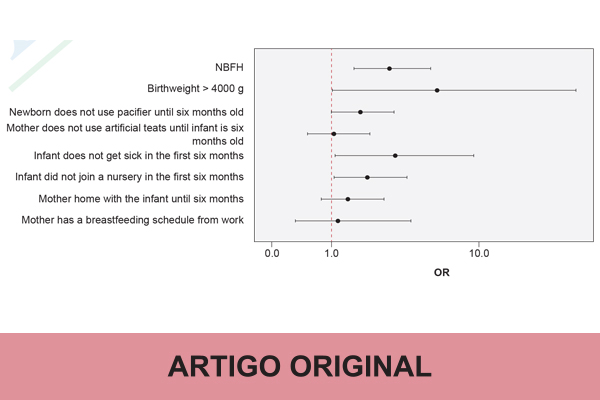SOCIAL MEDIA
Portuguese Medical Association's Scientific Journal

Introduction: Exclusive breastfeeding (EBF) is currently recommended until six months of age. The Baby-friendly Hospital (BFH) initiative an international program to promote breastfeeding, was launched in Portugal in 1994. The aim of this study was to identify the prevalence and factors influencing breastfeeding in the first six months of life and to compare the results with a study carried out in 1999 including population from the same geographic area.
Material and Methods: A prospective, longitudinal and observational study was carried out in two hospitals in the Lisbon metropolitan area, one BFH and another non-BFH. It consisted of different questionnaires answered by mothers at three distinct moments (zero, three and six months). The first questionnaire was applied between February and June 2019.
Results: A total of 423 infants were included, 324 from the BFH and 99 from the non-BFH. The breastfeeding rate was 94.3% at discharge, 78.2% at three months and 64.4% at six months, whereas EBF rate was 74.2%, 51.8% and 25.6% respectively. All women on EBF at six months, except one, were breastfeeding on demand. The discontinuation of EBF was associated with delayed skin-to-skin contact, Neonatal Intensive Care Unit admission, pacifier and artificial teats use, mother’s return to work earlier and lower education levels. Conversely, factors that promote EBF were older gestational age, adequate birthweight, breastfeeding initiation in the first hour of life, rooming-in practice, shorter hospital stay and absence of infant’s illnesses. Compared with 1999, although there was a significant improvement of breastfeeding rates at three and six months, the EBF rate was similar at six months (23%). Both studies identified the mother’s lower education level and mother’s return to work as contributing factors to breastfeeding discontinuation.
Conclusion: Our results are in agreement with previously reported causes of breastfeeding discontinuation and emphasize the importance of sociocultural factors. Compared with 1999, the breastfeeding rates in this Portuguese population increased significantly at three and six months. However, it is still necessary to improve in order to achieve the World Health Organization global target.